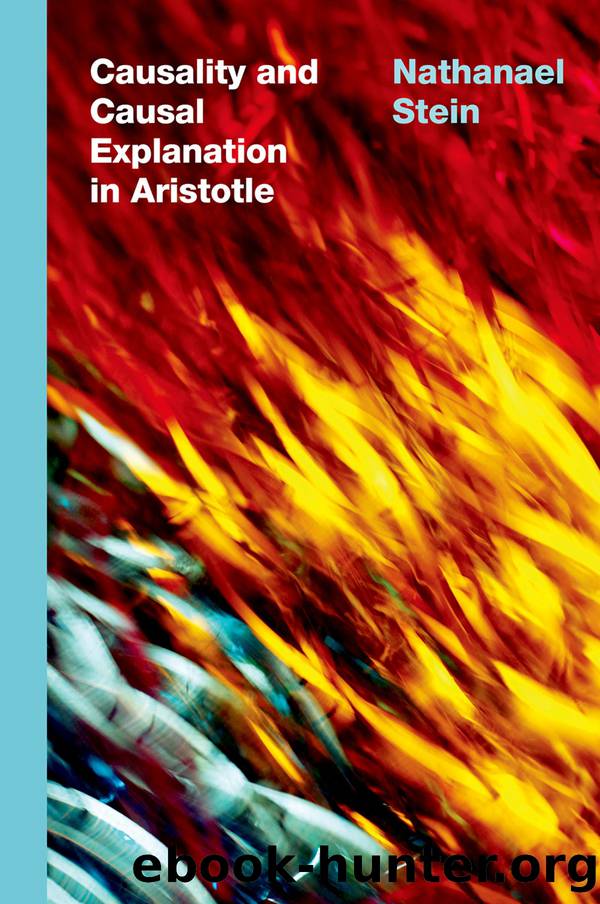Causality and Causal Explanation in Aristotle by Nathanael Stein;

Author:Nathanael Stein;
Language: eng
Format: epub
Publisher: Oxford University Press USA
Published: 2023-07-15T00:00:00+00:00
Thus, this passage also affirms a difference among end-directed efficient causes between those whose actualities are ends-in-themselves, exemplified most of all by the activities characteristic of substance, and those whose actualities are notâthat is, between the efficient causes for activity profiles and transeunt change profiles.
Likewise, Aristotle is at pains in Met. IX 1â6 to draw a distinction between the senses of potentiality and actuality related to change and those corresponding to activities like seeing and thinking, using the more familiar notion of a transeunt power to bring about change as a means of approaching the target notionâactuality (energeia)âindirectly. His way of proceeding shows that he recognizes clearly that the distinction is not obvious and constitutes a philosophical development that his audience will not take as trivial.31
Thus, differences in causal profile tend to coincide with distinctions Aristotle draws in the corpus which do not merely amount to differences of kind, but need marking in stronger ways, often requiring a good amount of philosophical work to discern. So even though Aristotle does not describe the notion of a causal profile as I have developed it here, it is reasonable to take it as capturing some of his key claims and commitments about causality.
One might raise a worry at this stage whether Aristotleâs four primary causal roles are therefore too metaphysically heterogeneous to be informative or constitute ânatural joints.â If the relationships included under âmatterâ turn out to involve genuinely different types of relationship, what are the grounds for thinking that they have anything important in common? And if they do, why not think that this common feature is the relevant causal property, rather than whatever differentiates them? Similar worries are and have been raised about Aristotleâs approach to other concepts like soul, his critiques of Platonic notions like the Goodâand indeed cause in general. His position on such matters is a philosophically complicated one: he must maintain that, for example, the different types of material causation relate to genuinely different types and/or senses of potentiality, but nonetheless ought to be understood as forming a coherent grouping, not merely analogous to one another. Rather, they are organized roughly in terms of their being different ways in which somethingâs abilities to bear various determinate features and exhibit different behaviors are grounded in its other persistent features. The role itself has content, he must say, though we do not fully grasp it except by way of its distinctive types of occupant. The worry is therefore relevant for Aristotleâs general approach to philosophical matters; I will return to it later (§§ 7.5 and 8.7).
Download
This site does not store any files on its server. We only index and link to content provided by other sites. Please contact the content providers to delete copyright contents if any and email us, we'll remove relevant links or contents immediately.
Phoenicians among Others: Why Migrants Mattered in the Ancient Mediterranean by Denise Demetriou(596)
american english file 1 student book 3rd edition by Unknown(595)
Verus Israel: Study of the Relations Between Christians and Jews in the Roman Empire, AD 135-425 by Marcel Simon(589)
Caesar Rules: The Emperor in the Changing Roman World (c. 50 BC â AD 565) by Olivier Hekster(569)
Basic japanese A grammar and workbook by Unknown(557)
Europe, Strategy and Armed Forces by Sven Biscop Jo Coelmont(513)
Give Me Liberty, Seventh Edition by Foner Eric & DuVal Kathleen & McGirr Lisa(491)
Banned in the U.S.A. : A Reference Guide to Book Censorship in Schools and Public Libraries by Herbert N. Foerstel(483)
The Roman World 44 BC-AD 180 by Martin Goodman(471)
Reading Colonial Japan by Mason Michele;Lee Helen;(462)
DS001-THE MAN OF BRONZE by J.R.A(458)
The Dangerous Life and Ideas of Diogenes the Cynic by Jean-Manuel Roubineau(451)
Imperial Rome AD 193 - 284 by Ando Clifford(449)
Introducing Christian Ethics by Samuel Wells and Ben Quash with Rebekah Eklund(447)
The Oxford History of World War II by Richard Overy(444)
Catiline by Henrik Ibsen--Delphi Classics (Illustrated) by Henrik Ibsen(416)
Literary Mathematics by Michael Gavin;(407)
Language Hacking Mandarin by Benny Lewis & Dr. Licheng Gu(403)
Brand by Henrik Ibsen--Delphi Classics (Illustrated) by Henrik Ibsen(379)
